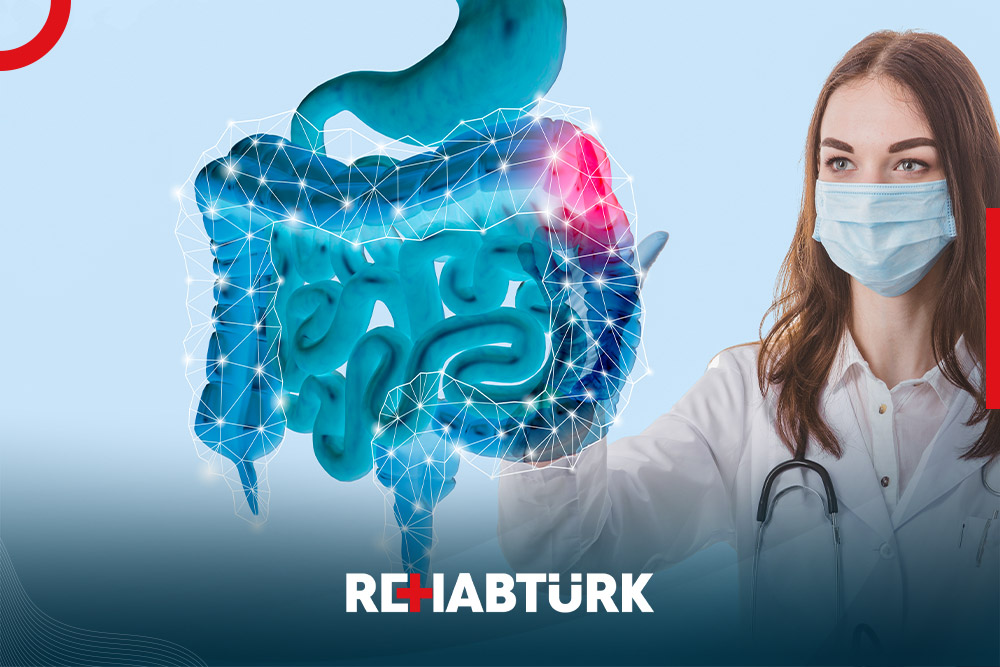Colon cancer treatment in Türkiye
Colorectal cancer is cancer that begins in the colon or rectum. The colon and rectum are located in the lower part of the digestive system. The rectum is located at the end of the colon.
It is important for the doctor to know the stage of the cancer so that he can come up with the best treatment plan for the patient and give an assessment of the long-term outlook.
Stages of colon cancer treatment
Colorectal cancer ranges from stage 0 to stage 4, which is the most advanced stage:
Stage 0: Also known as localized cancer, at this stage the abnormal cells are only in the inner lining of the colon or rectum.
Stage 1: The cancer has penetrated into the lining or mucous membrane of the colon or rectum and may have grown into the muscle layer. But it has not spread to nearby lymph nodes or to other parts of the body.
Stage 2: Cancer has spread to the walls of the colon or rectum, or through the walls to nearby tissues, but has not affected the lymph nodes.
Stage 3. The cancer has spread to the lymph nodes but not to other parts of the body.
Stage 4. The cancer has spread to other distant organs, such as the liver or lungs.

What are the symptoms of colorectal cancer?
Colon and rectal cancer may not have symptoms, especially in the early stages.
Symptoms of the early stages include :
- holding
- Diarrhea
- Changes in stool color
- Changes in the shape of the stool, such as narrow stools
- blood in the stool
- bleeding from the rectum
- excessive gas
- Colic
- Stomach ache
Symptoms of late stages (3 or 4) include:
Symptoms of colorectal cancer are most noticeable in the advanced stages (stages 3 and 4). In addition to the above symptoms, the patient may also experience:
- excessive fatigue
- Unjustified weakness
- Unintentional weight loss
- Changes in stool that last more than a month
- The feeling that the bowel is not completely emptied
- vomiting
If the cancer spreads to other parts of the body, the patient may also experience:
- Jaundice or yellowing of the eyes and skin
- Swelling in the hands or feet
- breathing difficulties
- Chronic headache
- blurry vision
- bone fractures
What causes colorectal cancer?
Researchers are still studying the causes of rectal cancer.
Cancer may be caused by genetic mutations, whether inherited or acquired. These mutations do not indicate that colorectal cancer is certain, but they do increase the chance of developing it.
Certain mutations may cause cells to accumulate abnormally in the lining of the colon and form polyps. These small growths are considered benign growths. Surgical removal of these bumps is a preventive measure. Untreated polyps can become cancerous over time.
Who are at risk of colon cancer?
There is a growing list of risk factors that work alone or in combination to increase a person’s chances of developing colorectal cancer.
fixed risk factors
Some of the factors that increase the risk of colorectal cancer are inevitable and cannot be changed. Age is one of them, as the chances of developing this cancer increase after reaching the age of fifty.
Some other established risk factors are:
- Previous history of polyps in the colon
- Also a previous history of bowel diseases
- Family history of infection
- Having certain genetic syndromes, such as familial adenomatous polyposis (FAP)
- Be of Jewish or African descent from Eastern Europe
variable risk factors
They are other avoidable risk factors. This means that they can be changed to reduce the risk of colorectal cancer. Avoidable risk factors include:
- Overweight or obesity
- smoking
- Drinking alcohol a lot
- Having type 2 diabetes
- Follow a sedentary lifestyle
- A diet rich in processed meats
How is colorectal cancer diagnosed?
Early diagnosis of cancer gives the best chance of curing it.
The doctor begins by obtaining information about your medical and family history. He also performs a physical examination. He or she may press on the abdomen or perform a rectal examination to determine if there are any lumps or bumps.
Stool test
Stool tests are used to detect hidden blood in the stool. There are two main types of test: the fecal occult blood test (gFOBT) and the fecal immunohistochemistry test (FIT).
Fecal occult blood test ( gFOBT )
During it, “guaiac” is used, which is a plant material used to cover the sample containing the stool. If there is any blood in the stool, it will change colour.
The patient should avoid certain foods and medications before this test, such as red meat and nonsteroidal anti-inflammatory drugs (NSAIDs), because they may interfere with the test results.
Fecal immunohistochemistry test ( FIT )
This test detects hemoglobin, a protein found in the blood. This test is more accurate than the guaiac-based test.
This is because it is not likely to detect bleeding from the upper GI tract (a type of bleeding rarely caused by colorectal cancer). Moreover, its results are not affected by foods and medicines.
Tests at home
Because multiple stool samples are needed to perform these tests, the doctor will likely give the test kits to the patient to use at home rather than having the test in the office.
blood test
The doctor may run some blood tests to get a better idea of the cause of your symptoms. Liver function tests and a complete blood count can rule out other diseases and disorders.
Sigmoidoscopy
Minimally invasive sigmoidoscopy allows the last section of the colon, known as the sigmoid colon, to be examined for abnormalities. Also known as flexible sigmoidoscopy, this procedure involves a flexible tube with a light on it.
Colonoscopy
Colonoscopy involves the use of a long tube with a small camera attached. This procedure allows the doctor to see inside the colon and rectum to check for anything unusual. It is usually performed after minimally invasive screening tests indicate the possibility of colorectal cancer.
During a colonoscopy, the doctor may remove tissue from abnormal areas. These tissue samples can then be sent to a lab for analysis.
Sigmoidoscopy and colonoscopy are among the most effective current diagnostic methods for detecting benign tumors that may develop into cancer.
X ray
Your doctor may order an X-ray using a radioactive contrast solution that contains the chemical element barium. The doctor introduces this fluid into the intestines through the use of a barium enema. Once in place, the barium solution coats the lining of the colon. This helps improve the quality of the x-ray images.
CT scan
A CT scan provides the doctor with a detailed picture of the colon. The CT scan used to diagnose colorectal cancer is sometimes called a virtual colonoscopy.
What are the treatment options for colorectal cancer?
Treatment for colorectal cancer depends on several factors. The general health condition of the patient and the stage of the cancer helps the doctor develop a treatment plan.
surgery
In the early stages of colorectal cancer, it may be possible for a surgeon to remove precancerous growths through surgery.
If the cancer has spread to the walls of the intestine, the surgeon may need to remove part of the colon or rectum along with any nearby lymph nodes. If possible, the surgeon reconnects the remaining healthy portion of the colon to the rectum.
If this is not possible, they may perform a colostomy. This involves creating an opening in the abdominal wall to remove waste. A colostomy may be temporary or permanent.
Chemotherapy
Chemotherapy involves using drugs to kill cancer cells. Chemotherapy is usually done for people with colorectal cancer after surgery and when it is used to destroy any remaining cancer cells. Chemotherapy also controls the growth of tumors.
Chemotherapy often comes with side effects that must be controlled with additional medications.
Radiation therapy
Radiation therapy uses powerful pulses of energy, similar to those used in X-rays, to target and destroy cancer cells before and after surgery. Radiation therapy usually occurs alongside chemotherapy.
Other medications
Targeted therapies and immunotherapies may also be recommended for colorectal cancer. Medications approved by the US Food and Drug Administration (FDA) include:
bevacizumab (Avastin)
ramucirumab (Cyramza)
Zif Aflibercept (Zaltrap)
cetuximab (Irbitux)
panetumab (victebex)
regorafenib (Stivarga)
pembrolizumab (Keytruda)
nivolumab (Obdivo)
ipilimumab (Yervoy)
They are used to treat metastatic or late stage colorectal cancer that has not responded to other treatments and has spread to other parts of the body.
What is the survival rate for people with colorectal cancer?
Being diagnosed with colorectal cancer can be stressful, but this type of cancer is highly treatable, especially when caught early.
The 5-year survival rate for all stages of colon cancer is estimated at 63% based on data from 2009 to 2015. For rectal cancer, the 5-year survival rate is 67%.
Can colorectal cancer be prevented?
Certain risk factors for colorectal cancer, such as family history and age, can’t be prevented.
However, lifestyle factors that may contribute to colorectal cancer can be prevented. It may help reduce the risk of this disease in general. Steps can now be taken to reduce the risk by:
- Reducing the amount of red meat in meals
- Avoid processed meats, such as sausages and deli meats
- Eat more plant foods
- Reduce dietary fat
- Exercising daily
- Weight loss, if your doctor recommends it
- Quit Smoking
- Reduce alcohol consumption
- Reduce stress
- Management of pre-existing diabetes
Another preventive measure is to make sure you get a colonoscopy or other cancer screenings after the age of 50. The earlier the cancer is caught, the better the outcome.
How can I book for colon cancer treatment in Türkiye?

- Free medical support on the phone: You will have a dedicated representative for your health condition who is always ready to answer your questions.
- Free consultation with a specialist doctor: Your medical representative will consult with a number of doctors and hospitals to find the best possible treatments.
- Free travel visa arrangement: We will contact the embassy in your country to assist you in obtaining a visa to visit Türkiye.
- Free itinerary planning: We will create a schedule for your medical trip to Türkiye.
- Free translation of documents and reports: We will translate medical documents and reports into Turkish on your behalf.
- Free support and monitoring: We will monitor the stages of treatment and be by your side every step of the way.
- Free instant translation: We will be with you during the treatment stages to provide translation between you and the medical team.
- Free accommodation and transportation coordination: We will book accommodation for you and your companions in Türkiye, along with transportation services.
Contact REHABTÜRK doctors for more information about the procedure and to evaluate your medical condition.

